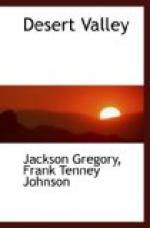Howard heard and looked away through the growing dusk and saw, not the scope of a dimming landscape, but something of the soul of Kish Taka. He understood that the Indian had given his confidence freely and he knew that it was, no doubt, the first and last time in his life that he would so speak with a bahana. And it was because Howard had shared his last water with him and was, therefore, ‘brother.’ Kish Taka was an implacable hater; he would follow Jim Courtot until one of them was dead. Kish Taka was a loyal friend, for the Hopi who will bare his heart to a man will bare his breast for him.
Further questions Howard did not ask, feeling that he had penetrated already further into the man’s own personal matters than he should have done. He had heard tales such as all men hear when they come into the influence of the desert south-west, wild tales like those he had recounted about Superstition Pool to Helen and her father, wilder tales about a people who dwelt on in the more northern and more bleak parts of the desert. Lies, for the most part, he judged them, such lies as men tell of an unknown country and other men repeat and embroider. There were men whom he knew who maintained stoutly that the old Seven Cities of Cibola were no dead myth but a living reality; that there were a Hidden People; that they had strange customs and worshipped strange gods and bowed the knee in particular to a young and white goddess, named Yohoya; that they hunted with monster dogs, that they had hidden cities scooped out centuries ago in mountain cliffs and that they were incredibly rich in gold and turquoises. Lies, perhaps. And yet a lie may be based upon truth. Here was a high-type Indian who called himself Kish Taka, the Hawk Man; he hunted with such a dog; he camped on the trail of a bahana who had betrayed and robbed his people. That bahana was Jim Courtot. What had taken Jim Courtot into that country? And now that he was back, Jim Courtot was flush. And, when Sandy Weaver had mentioned certain tracks to him, he had stared over his shoulder and turned white! Truly, there were many questions to ask; but Howard refrained from asking them.
‘This Indian has played a white man’s part to me,’ he told himself. ‘And his business is his own and not mine.’
‘Come,’ said Kish Taka abruptly out of the silence into which they had sunk. ‘Cool now, we go.’
They had but little water remaining in Howard’s canteen, and Kish Taka scorned carrying water for himself; but he had outlined the trail they would take and appeared confident that they would not suffer from lack of water. They struck out toward the south-east, the Indian swinging along ahead, his body stooped a little forward, his thin arms hanging loose at his sides. Several times Howard stopped to drink; the Indian drank once only before their arrival at the spring. Here they rested and ate. The night was already far advanced and glorious with its blazing stars, and they did not tarry long. In half an hour they moved on again. As day was breaking Kish Taka led the way up a steep-sided mesa and, catching Howard’s arm, pointed out toward the east.




